
The 2018 Emerging Creatives Track: Key Takeaways
Undeterred by the polar vortex, in early 2019 Robyn hopped on a plane and flew 4,000 miles from London to the Windy City, joining FCB Chicago as an art director and writer (yes, both). She works as part of FCB’s experiential arm, FCBX, as well as the wider agency, creating bold above-the-line and digital campaigns for some of their biggest clients.
Back in London, she was a creative at Poke (Publicis), where she crafted award-winning campaigns for Heineken, EE, Google and Garnier.
Her words are just as likely to be found in Campaign opinion pieces, Forbes and Buzzfeed as they are in ads. In August 2019, she co-created “Untold Stories,” a column in partnership with Campaign, which invites anonymous stories about the “we know it's there, but we won't talk about it” topics in the advertising industry.
Most recently, she was named one of The Dots’ 100 Trailblazers redefining the creative industry.
OPENING KEYNOTE: “COURAGEOUS CREATIVITY”
SPEAKER: Piera Gelardi, ECD and Founding Partner, Refinery29
Who’d have thought the first session of the Emerging Creative Track would be held in Piera Gelardi’s office? Not I. Piera metaphorically leads us into ‘The Peach Pit,’ her child-of-the-90s-meets-90210 peach-tinted space where creativity is everything, but individuality is more. Rosé flows after five. A bedazzled No Limitations buzzer (a la X Factor?) sits on the side, reserved for beeping words such as ‘timeframe’ and ‘budget’. They, along with inhibitions, can see their own way out.
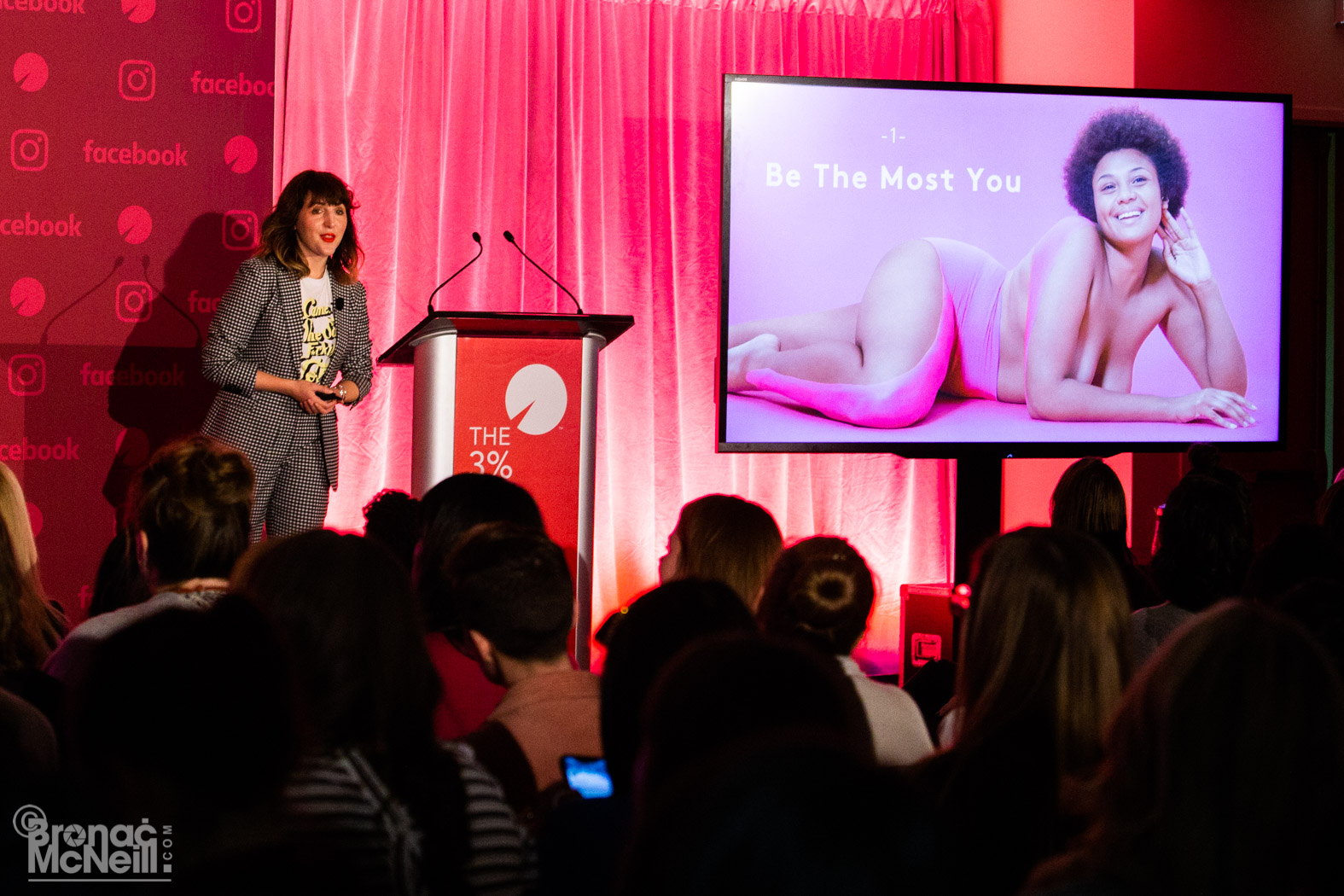
Once a month, Gelardi invites the lovely people of Refinery29 into her office to brainstorm. The Peach Pit makes everyone feel welcome as they stand up and shake it out, quite literally – as we did – to get out of their heads and into their bodies.
Being the most you, recognising that friction creates sparks, and creating the conditions for creativity are the three pillars of Piera’s talk. She recounts her own journey from growing up reading sassy magazines in Maine to building Refinery29 for a new generation of women who epitomize diversity, strength, being seen and claiming their power.
Sans-Instagram, magazines were a window into another world for Gelardi – a world of powerful women. And she wanted in. Once there, she felt out of place in jargon-slinging executive meetings, so she spoke up and questioned. Instead of the expected eye roll responses, she got answers and thank you’s. Turns out she wasn’t the only one who didn’t speak acronym. Frustration with the creative process, like everyone hiring their mates (#relatable), became a change in mindset and approach to working with different teams.
This manifested in creative strength and building the Refinery29 brand – and shooting its own stock imagery to reflect their audience. Individuality, inclusivity and imagination were the front-runners here.
A flick through the No Apologies collection created with Getty Images reminded us that we can be ourselves and give precisely zero fucks about that. In the wake of the Presidential Election, Refinery29 created protest art – pictures of strength, anger, hope and freedom of expression for people marching. It wasn’t in a brand-getting-down-with-the-kids way – it was human. It also created a space for clients to speak up and stand for something (such as the Unilever #UNSTEREOTYPE alliance).
Suddenly, Piera looks around the room. She says ‘You can do it. When I say this, I want you to reply ‘I can do it.’’
She said it. We did it. It was a brilliant moment. Those few words were unexpectedly emotional and instilled some necessary self-belief I didn’t realise I was lacking. I’m sure I’m not the only one who felt like this.
If you ever sit there thinking ‘I wonder if I’m creative enough for this job’ (hands up, all of us) then Piera recommends switching up your environment. ‘We beat ourselves up for moments of perceived deficiency, but instead, think of the moments you’re on fire and find what the context was.’
Piera opens her office door. We step outside and into 29Rooms, aka Refinery29 IRL. She describes the power of bringing a brand to life through live experiential art. It’s another condition for creativity; it’s a collaboration with whoever walks into the space, shakes themselves out and brings their individuality; it’s courageous and contagious; it’s creativity at its finest. Piera says it makes her ‘feel more creative and dream bigger.’ Case closed.
TWO YEARS POST-CANNES: HOW “SEE IT BE IT” CHANGED MY CAREER
SPEAKERS: Krystle Mullin, ACD, RPA - Carrie Dunn, ACD/Writer, Freelance - Tahira Edwards-Byfield, Senior Writer, 72andSunny
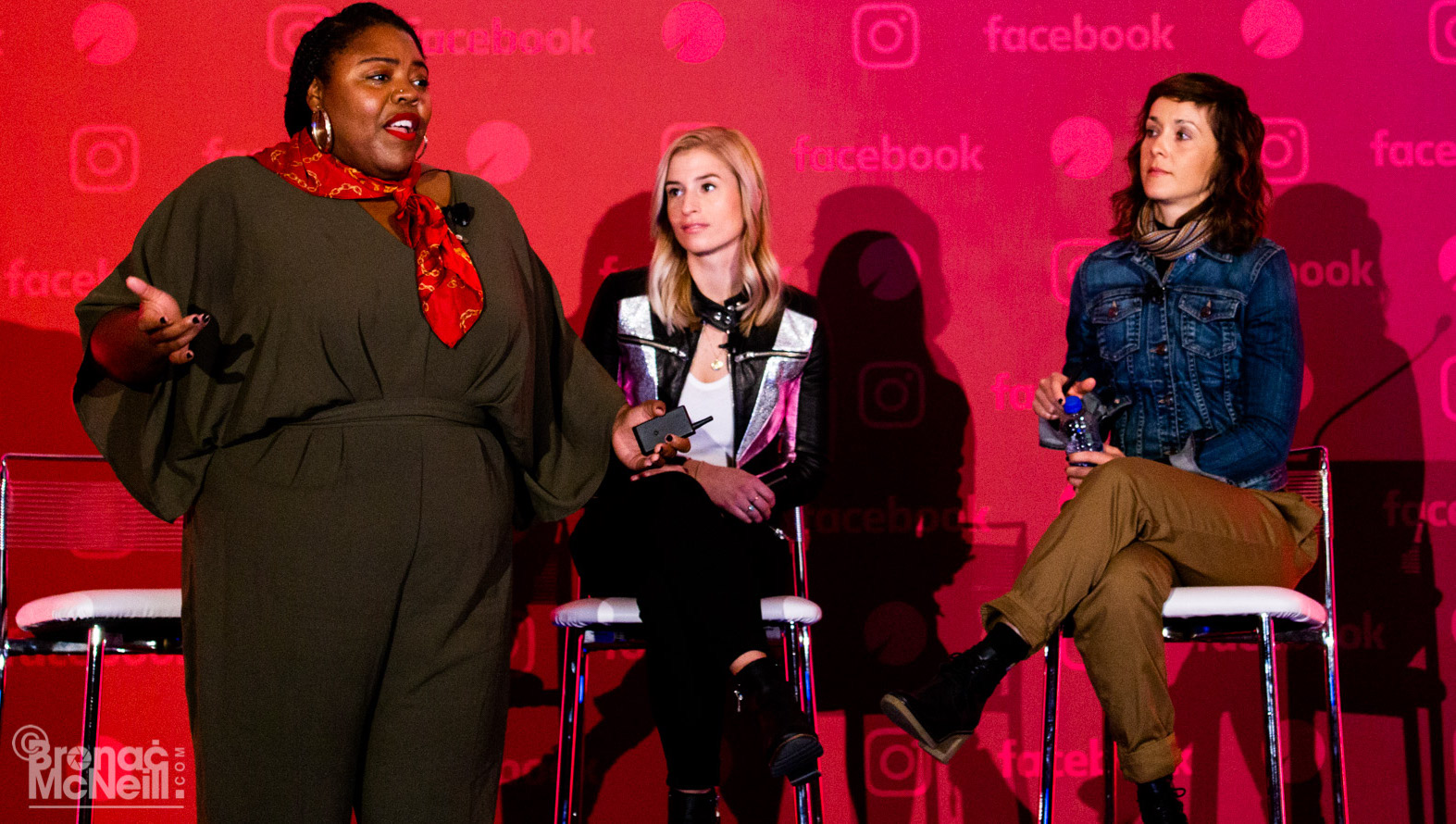
See it. Be it. Bring it.
All before lunch?
You bet – thanks to Krystle Mullin, Carrie Dunn and Tahira Edwards-Byfield who pumped us full of inspiration and ACTIONABLE takeaways (a rare and beautiful thing).
Krystle kicked us off with the ‘See it’ part. Seeing it from a young age wasn’t hard for her, thanks to Xena: Warrior Princess, her fictional female leader. She was brave, kind, a risk-taker, strategic, confident, and considerate. Stepping into the advertising industry, however, she saw a very different world – one that was male-dominated. Her copy tutors, interviewers, seniors – all male. To this day, she’s never been interviewed by a female CD. Let that sink in.
However, being part of ‘See It, Be It,’ she was surrounded by the Xenas of the ad industry. She describes sitting down with Madonna Badger for a one-on-one mentoring session (!!!) ‘It would be like Hillary Clinton and Beyoncé looking you in the eyes at the same time – that’s what it felt like.’
Be still our beating hearts.
‘Already you are that which you need.’ When you go home and don’t see yourself reflected in those around you, you become the mirror. Perhaps you’re already the leader you need – you’re just not aware of it.
Krystle encouraged us to look at what we already do well and keep doing it well. She left us with one of her favourite Nike ads, with the line ‘Does a hero know she’s a hero if no-one tells her?’ To see it, you must not only look for people to learn from, but you must see yourself in a new light. See yourself through someone else’s eyes. See yourself as a leader.
Next up, Carrie told us how she put the ‘Be it’ bit into action post-Cannes. Referencing Katty Kay, journalist and co-author of ‘The Confidence Code,’ she served up this slice of reality to start:
‘Men push for promotions when they’re 60% qualified. Women push for promotions when they’re 100% qualified. Women underestimate their abilities by 30%. So – we need to be at 130% before we’d even consider going for it.’
Food for thought.
She started out thinking that if she got her head down, worked hard and stayed quiet, the leaders would see her (sound familiar?) – but it doesn’t often work out that way. So she started building her confidence. Externally, that meant speaking up, standing by ideas, and pushing for what she deserved, even though it’s easier to stay quiet. Internally, this meant being kinder on perceived deficiencies and believing in the value she brought the room she walked into.
‘Being it’ manifested in an International Women’s Day project at 72andSunny. Originally posing the question ‘what makes you a boss?’ to the women on her team resulted in discomfort from literally everyone. So she switched it up and interviewed every woman on her team, taking a minute to help them say their strengths. The main takeaway here? Build your confidence – not only for yourself but for the women around you. Because you can’t lift other people up if you don’t believe in yourself.
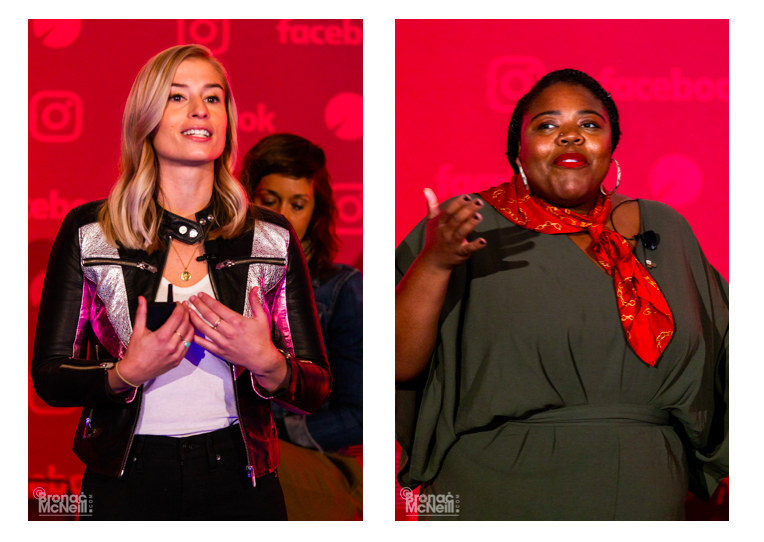
Just when I thought it couldn’t get any better, we got Tahira. And damn did she Bring it, starting with a pearl of Tracee Ellis Ross wisdom: ’Self-care does not mean going to the spa. It’s learning to say no. It’s knowing yourself so you can make choices that are an expression of you.’
Hold my cucumber slices.
Tahira asked us what we’re doing for ourselves. The side hustles and hard work are great, sure – but if we hit burnout we can’t hit our goals. ‘Keep it real. Keep it kind. Coz bringing it is hard AF sometimes. We are TIRED. It’s tough – but let’s treat ourselves like we’re our own best friends.’
She reminded us that boundaries are boss and that ‘no’ is a complete sentence. Tahira could have mic-dropped at that very moment and I’d have stood up and clapped. But wait – there’s more.
‘Self-care is about finding your safe space, because if you’re always having to armour up then you won’t feel your best. Remember to bring it fully, and bring it big – don’t ever shrink yourself. If you’re any of the ‘others’ – a person of colour, queer, a person with a disability – we’ve been taught we have to chip away at ourselves to fit into the squares. You’re a STAR. You can’t fit in their boxes. If you can’t bring yourself, you don’t need to be there.’
LUNCH + LEARN: IMPROV CLASS
SPEAKERS: Wendy Mateo, Jason Ball, Becca Barish from Second City Works
Fact: never before have I laughed into my salad. Then I went to 3%. This Lunch + Learn was a game changer.
Wendy Mateo, Jason Ball, and Becca Barish of Second City Works – an arm of the infamous Second City comedy theater – got us up and out of our comfort zones for an hour-long embrace of improv. As such, I took no notes, so this summary will be short and sweet.
You could feel the anticipation as we were all asked to stand (oh gawd, are they going to pick someone out of the crowd?) and a collective exhale as a volunteer stepped up on stage. For the first bit of improv, we were instructed to clap after every sentence spoken by said volunteer.
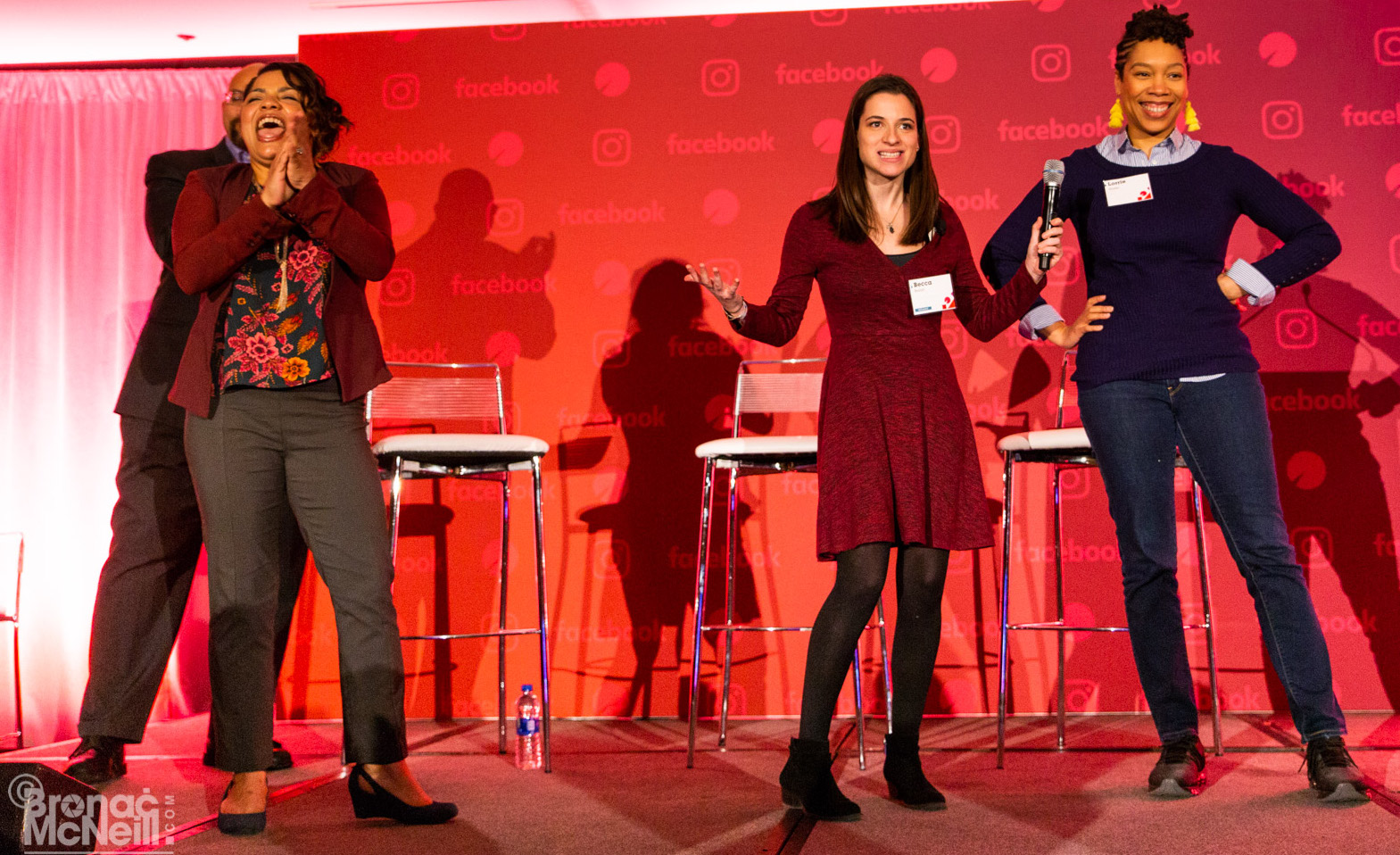
She said it made her feel amazing and heard – and I felt like I was really listening and appreciating what she had to say. A win-win.
My main takeaways:
- The creative bit of your brain has your back. Even if you’re worried about what you’re going to say, trust that your mind will whip up some magic in the moment.
- Trust your intuition.
- Anticipate the needs of others – how can you make things easier for them? How can you stay one step ahead of the game so everybody leaves a) a winner and b) feeling confident in themselves?
If you want to know what else we did you’ll just have to book Second City Works for your own in-office improv session.
HOW TO FAIL
SPEAKERS: Janet Kestin, Co-Founder, Swim and Nancy Vonk, Co-Founder, Swim
‘I’ve been fired twice…’
‘…and lived to tell the tale.’
Nancy Vonk and Janet Kestin, everybody. Name a more iconic (advertising) duo – I’ll wait.
They’re the women behind Dove’s Campaign for Real Beauty, ex-co-Chief Creative Officers of Ogilvy Toronto, authors of Darling, You Can't Do Both, co-founders of Swim leadership lab – and here they are giving us a masterclass in epic failure? Weird flex, but ok.
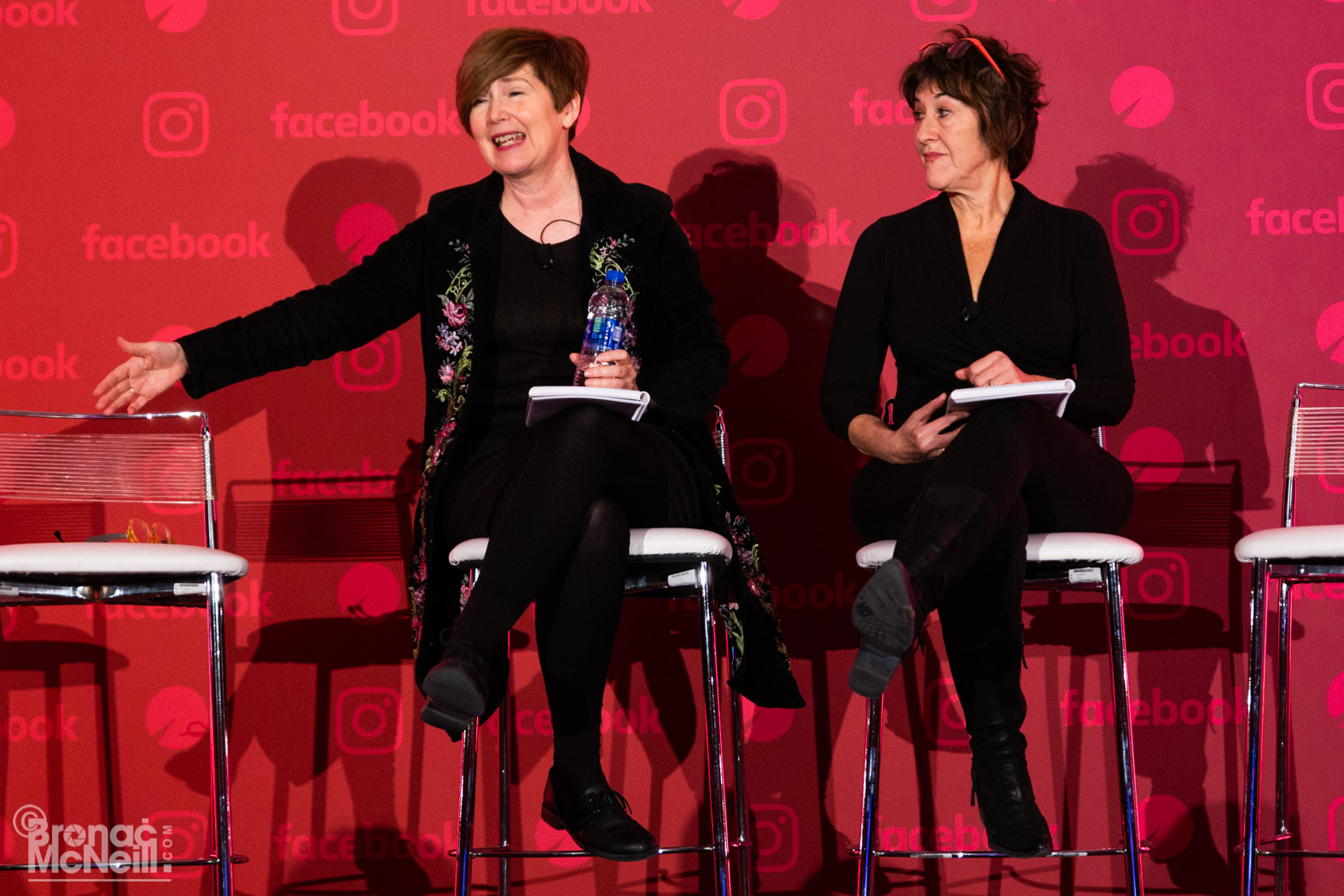
When they introduced the concept of ‘The Mask of Success’ however, the penny dropped – nobody ever says ‘here are 100 ways this person messed up before this very successful thing happened.’ Failure is inevitable, but the beauty is that opportunity is built into every failure, so every failure is an opportunity for success.
On that note, here’s their toolkit:
1. ‘Why’ not ‘what.’ Instead of examining what went wrong, consider why xyz situation happened and whether we can take something from it to apply in the future.
2.It’s not you. It’s hard to think that the ideas we created and grew don’t work for other people, but don’t get attached.
3. Get a filter. You know that feeling of getting worked up and having something on the top of your tongue? What about waiting a beat or ten to think about whether it will help you get your way.
4. Respect. It should be a given, but treating people with disrespect ‘is not only bad karma, but it also breaks trust, and that is very difficult to come back from.’
5. Empathy. It’s easy not to have empathy for clients – particularly when they don’t get the ideas we’ve poured our heart and soul into. But we must remember that they need empathy as much as our campaigns should be infused with it.
6. Space for failure. No matter how hard we try, we can’t avoid failure. Remember the point up top – positivity and opportunity are born from it.
7. It’s not that bad. We tend to exaggerate the outcome – it’s likely not a catastrophe. Keep that in check.
8. Failure is temporary. Own your mistakes then move on.
9. What if we set out to find the women who fail? Just think what we could learn from each other.
10. We need ‘fuck up nights.’ Let’s all go and confess our failures in public and then turn them into something valuable.
#UNFILTERED YOU
MODERATOR: Maud Deitch, Creative Lead, Instagram
PANELISTS: Lauren Rodwell, Brand Manager, Instagram - Joyce Chen, Head of Production, Facebook - Yahkeema Moffitt, Copywriter, Facebook - Bekkah Sirrine, ECD, Instagram
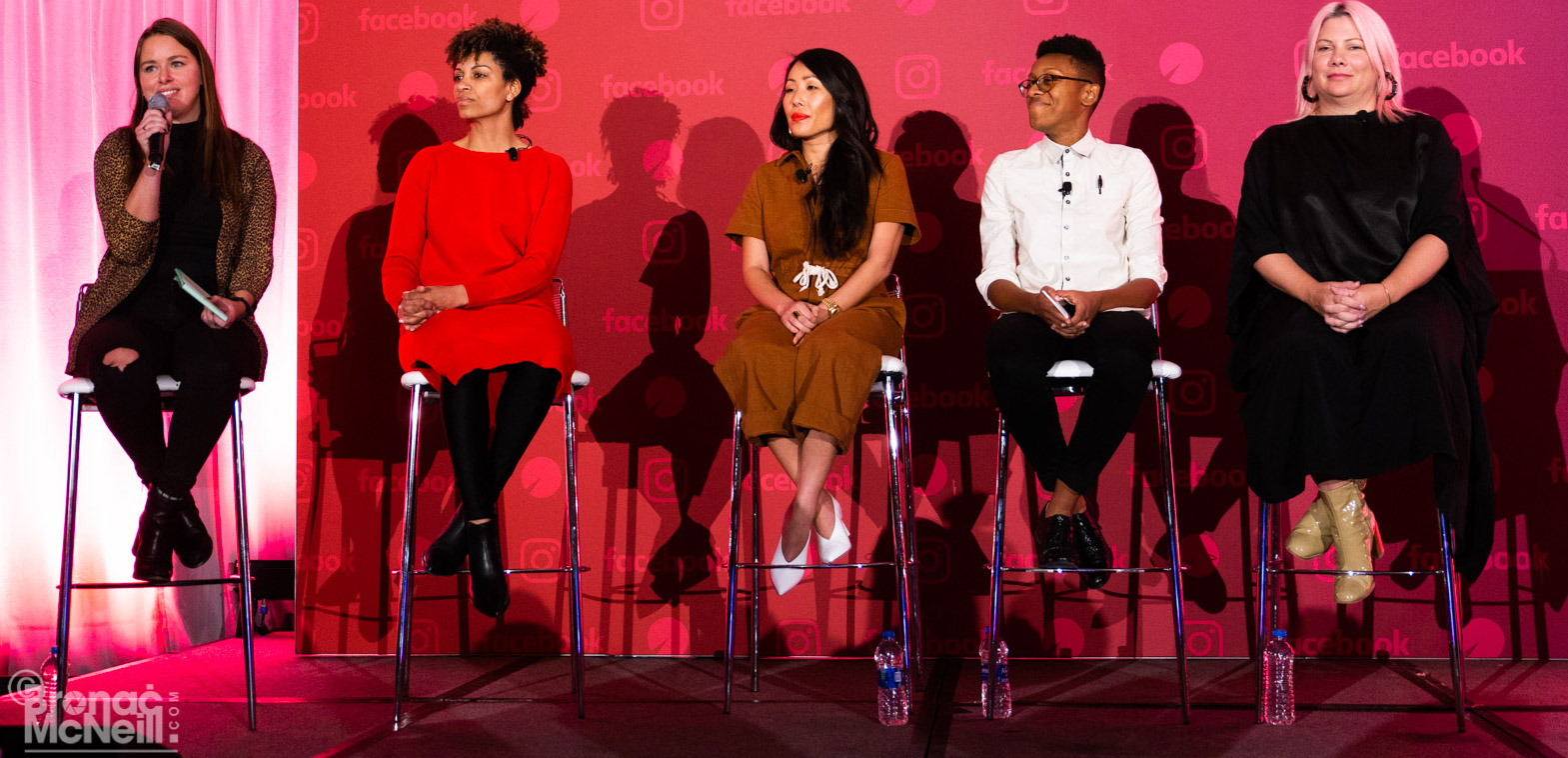
Yes, we’re moving from Nancy Vonk and Janet Kestin telling us to ‘get a filter for god’s sake’ into a panel titled #unfilteredyou. I was as intrigued as you.
‘Bringing your whole self to work comes with a risk and an asterisk,’ Maud Deitch began. ‘They tell you to bring your authentic self – and you think ‘cool, ok – that’s great in theory.’ But if you’re not a white man that doesn’t apply to me.’
What does it say about our industry that we’re worried our leaders and co-workers will think we’re nuts if we share a personal story or experience or voice an opinion? Deitch dug into this, saying ‘We need leaders who empathise. It goes beyond confidence and succeeding in creating a safe environment for brilliant people who may not feel they can be brilliant.’ She recounted a time where Bekkah Sirrine, her boss, was exceptionally supportive. Bekkah pointed out the necessity of recognising everybody as humans who all function in a similar way. ‘This is just a job. It’s a short time we’re here. We need the ability to empathise with colleagues – that’s what it’s all about.’
Contentious as this point might seem, the cynics amongst us may suggest this is reminiscent of the stereotypical daughter-in-law and her mother-in-law sat side by side, being asked if they get on. It’s also worth remembering that while our panel of speakers are all lucky enough to work for a company that allows them to bring their full selves to work – for the most part – this is not the norm in many companies, as we explore.
Lauren Rodwell’s account of how she filters herself was so raw, I just want to stick quotation marks around my notes and not add my own two pence. ‘My filtering turns me into the LA woman next to me with blonde hair. How can I use the same words as her? As a black woman, I filter myself. The moment I slip it will be interpreted that because I’m black I don’t have the answers – but you can never have all the answers.’
Rodwell spoke of the masks and facades that she applied but subsequently broke, allowing her to move and progress and learn to be her authentic self. Being fake stops you from experiencing the real world, and that means missing out.
Joyce Chen spoke of how she didn’t know how to show up because she didn’t know what would make her happy. Detailing her upbringing as a daughter of parents who immigrated from Taiwan, she says she felt she was carrying the responsibility of living up to their sacrifice of leaving family and home for better opportunities. ‘I imagined my ancestors saying ‘Don’t fuck up! Don’t let us down!’
That feeling of constantly having to prove yourself can manifest in various ways and be triggered in pretty much any environment. Back to work – like the pressure to fit in with the guys so they think you’re cool. ‘Who else calls guys ‘dude’ to fit in? Yeah – we talk like the bros.’
Joyce spoke openly about the journey she went on (literally) to find her authentic self, which included yoga, visiting an ashram, and going to therapy. Her mission? To change the world – so when she went to VB+P as a producer she decided she wanted to make a film about immigration. She brought her mission and her passion into her work, paying her learnings forwards, so she could be her full self in that environment too.
Yahkeema Moffitt cut right to it, saying that as a black gay woman with ADHD, she has so much to think about when walking into a workplace. She described people ‘rewarding’ her for being one of the quiet ones when she was growing up but more recently being told to speak up and become more comfortable doing so.
While one thing is expected of a black woman, another is expected of a woman in advertising, she says. ‘If I hadn’t filtered would I be right here?’
We ended on a discussion of filtering to fit into the bro culture of Silicon Valley. ‘If you’re the only woman or person of colour… you have the opportunity to come in – as a leader and a person of colour – and do something about it. You can defend the other people who may not have a voice, and create space where there wasn’t before.’
Finally, let’s take a moment to talk about showing emotion: ‘‘If you’re going to cry at work go outside?’ Fuck that – we don’t have time to go outside.’' Glad we cleared that up.
2018 NEXT CREATIVE LEADERS
MODERATORS: Laurel Stark, CD, Firewood and David Jackson, Creative Producer, The One Club for Creativity
PANELISTS: Nedal Ahmed, Senior Copywriter, Droga5 - Maddy Kramer, Senior Art Director, Saatchi&Saatchi - Gayatri Sriram, Digital Creative Head, FCB Ulka - Krystle Mullin, ACD, RPA
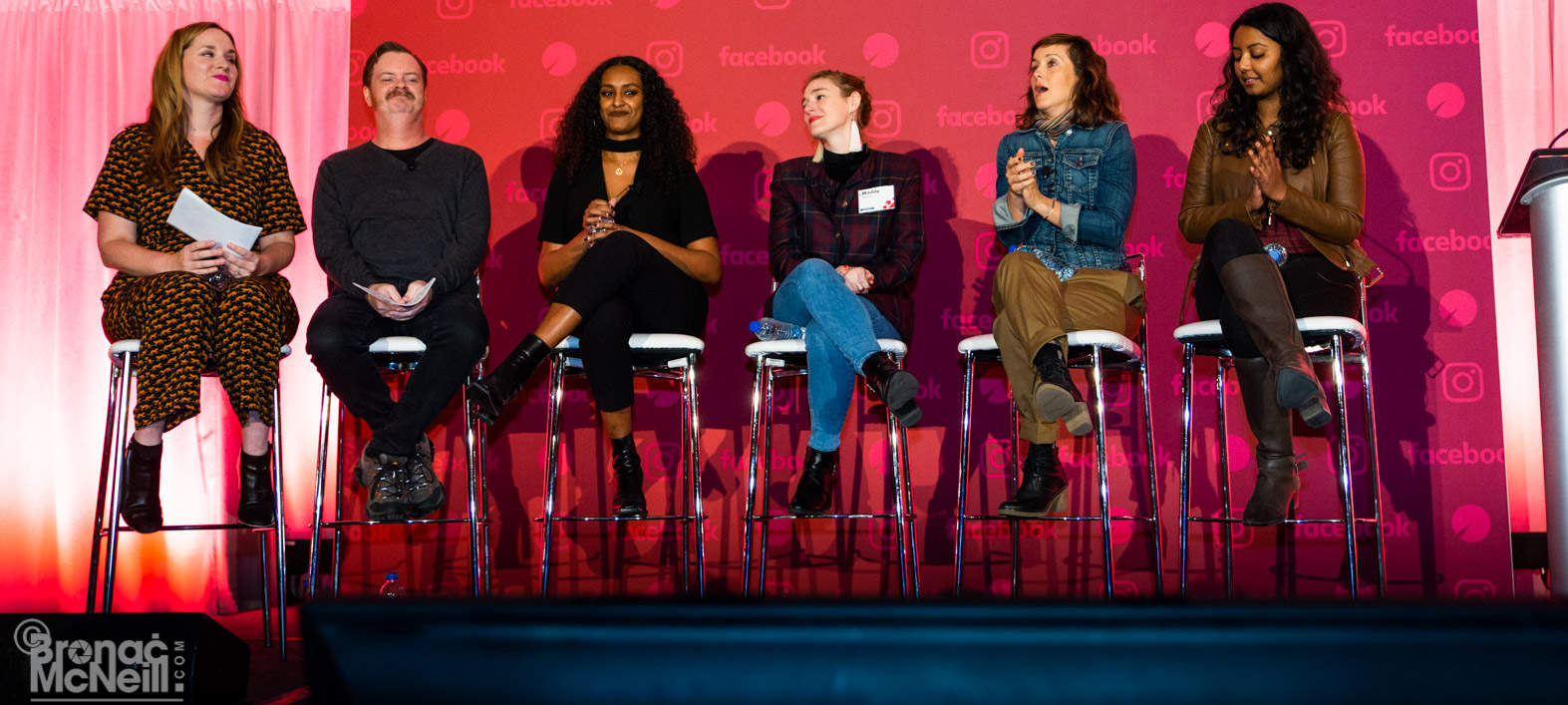
When the lights came up there wasn’t a dry eye in the room. We’d just watched P&G’s ‘The Talk’ – and we knew we still had four more to come: ’It’s a Tide Ad’ (tears of laughter), ‘#LoveMadeLegal: Nobody’s Memories,’ and ‘The Times of India: No Conditions Apply.’
Nedal Ahmed spoke about the genesis of the campaign and the bravery of P&G in supporting The Talk. Many brands are hesitant to talk about race, and when they do, people question their right to do so. Yet as advertisers, we have the power to direct millions into important messages. Nedal explained that if such a message comes from a brand it must be several things: for the greater good, speaking from an informed perspective, and addressing the subject sensitively. ‘There’s a balance of being brave enough to put something out, then the internal dialogue of keeping yourself and your team honest and asking the right questions.’
Ahmed concludes that despite this, P&G were boycotted through online petitions, but exposure to more and more conversations on ‘controversial’ topics will gradually change opinions. As a creative, remembering that not everyone will be ok with what you’ve created helps the process.
Gayatri Sriram talked us through the creative process behind the beautiful ‘No Conditions Apply.’ It’s a rally cry to end gender bias and division in society in the face of a 400 year-old tradition. Sriram highlighted the importance of creating from an informed perspective, noting the involvement of CCO Swati Bhattacharya who contributed an authentic and personal point of view, which strengthened the campaign further.
Ohh, Tide. I’ve spent the best part of a year questioning how they concocted something so brilliant about laundry. LAUNDRY. Maddy Kramer, Senior Art Director on the campaign, told us how they spent months thinking about stains, writing hundreds of scripts before flipping it to talk about how Tide is the best product on the market. She said a simple idea and a big, diverse team made it better. The collaboration with Old Spice, seen as ‘a dude account,’ was important. We can’t thrive just working on tampon ads, guys.
She says that those who reach CD level sometimes don’t see room – or make room – for anyone else in the same role. ‘Others don’t have as much hope, or help for exposure.’ She directed us to invisiblecreatives.org, which aims to create the largest female creative database to right the ratio in advertising.
Then we got another dose of Krystle Mullin. She talked about #LoveMadeLegal and the necessity of visibility, in teams and in our work. Why ‘we open on a husband and wife? Why not ‘we open on two non-gender conforming people,’ or ‘we open on two men or two women?’ Authenticity is so important – if you can tell the truth about the world you can show a community.’
In creating the work, they asked countries around the world to share stories of same sex marriage – and 77 got involved. But it goes beyond our work, Mullin stresses. We need to make changes every day to push for representation and equality. ‘I was on the phone and they asked ‘what does your husband do?’ Why isn’t it ‘What does your wife do?’'
As advertisers, we’re lucky enough to be able to bring more than just scripts to our clients – we can bring actions, suggestions, and accountability. Simply asking ‘what do your internal numbers look like?’ we have the power to impact how companies operate and align with their messaging. These are our next creative leaders – and I can’t wait to work for them.
WRAP UP:
It feels near impossible to sum up the above. But what I can do is urge anyone who’s reading this to please send your non-management creatives to 3%. This isn’t #spon or an #ad – it’s from a creative who’s been in the industry for just under 18 months and was given the opportunity to help map out the future for both the industry and my own career across a life-changing two days. Influencing the perspectives of those new to the industry is far easier than changing the (possible) creatures of habit at the top. It’s not a ‘one or the other’ – we need you (and we can’t make policies yet). But please recognise that the industry needs us too.
Why deny an up-and-coming creative the chance to sit amongst and learn from the world’s best and brightest business minds from world-class agencies on ways to make business better? We’re your future CCOs and creative leads – so let’s talk retention. Sending us will keep us. We’ll come back armed with the tools to make agencies better, the work stronger, and teams what they should be – diverse, equal and fair. All those things equate to mind-blowing creativity. And isn’t that what we’re in the business of?




